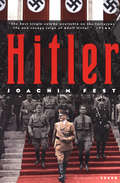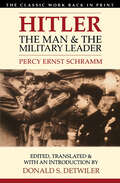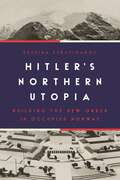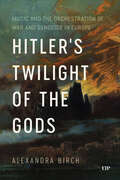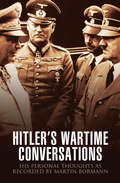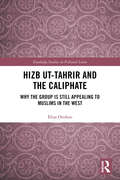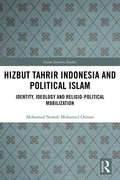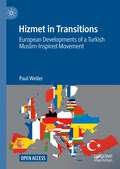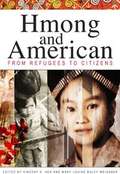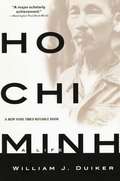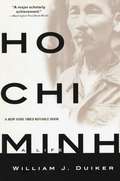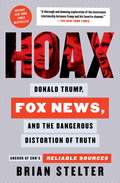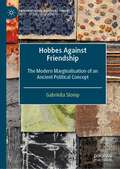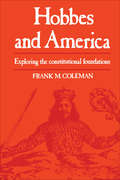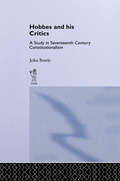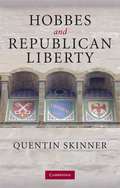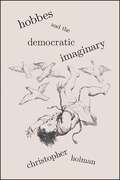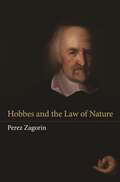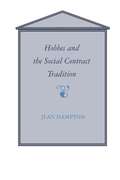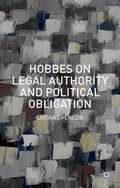- Table View
- List View
Hitler: A Portrait of a Tyrant
by Albert MarrinA biography of the struggling Austrian artist who rose from obscurity to power as the leader of the Nazi party and, later, the German nation, and whose ambitions led the world to war.
Hitler: Eine Biographie (Pelican Ser.)
by Joachim C. FestA bestseller in its original German edition and subsequently translated into more than a dozen languages, this book has become a classic portrait of a man, a nation, and an era. Index. Translated by Richard and Clara Winston. A Helen and Kurt Wolff Book
Hitler: The Man and the Military Leader
by Donald S. Detwiler Percy Ernst SchrammPercy Ernst Schramm, one of Germany's most distinguished historians, had exceptional access to Adolf Hitler because from January 1943 to the end of the war he was the Fuhrer's official war diarist. This classic volume, long out of print, contains the introductions written by Schramm to critical editions of Hitler's Table Talk and the official War Diary of the High Command of the Wehrmacht. In addition, there are two appendices: the first consisting of excerpts from a study composed by Schramm for the Nuremberg Trials on relations between Hitler and the General Staff; the second a memorandum written by General Jodl in 1946 on Hitler's military leadership.
Hitler’s Germany: Origins, Interpretations, Legacies (2nd edition)
by Roderick StackelbergHitler's Germany provides a comprehensive narrative history of Nazi Germany and sets it in the wider context of nineteenth- and twentieth-century German history. Roderick Stackelberg analyzes how it was possible that a national culture of such creativity and achievement could generate such barbarism and destructiveness. This second edition has been updated throughout to incorporate recent historical research and engage with current debates in the field. It includes: - an expanded introduction focusing on the hazards of writing about Nazi Germany; - an extended analysis of fascism, totalitarianism, imperialism, and ideology; - a broadened contextualization of anti-Semitism; - discussion of the Holocaust including the euthanasia program and the role of eugenics; - new chapters on Nazi social and economic policies and the structure of government as well as on the role of culture, the arts, education, and religion; - additional maps, tables, and a chronology; - a fully updated bibliography. Exploring the controversies surrounding Nazism and its afterlife in historiography and historical memory, Hitler's Germany provides students with an interpretive framework for understanding this extraordinary episode in German and European history.
Hitler’s Northern Utopia: Building the New Order in Occupied Norway
by Despina StratigakosThe fascinating untold story of how Nazi architects and planners envisioned and began to build a model “Aryan” society in Norway during World War IIBetween 1940 and 1945, German occupiers transformed Norway into a vast construction zone. This remarkable building campaign, largely unknown today, was designed to extend the Greater German Reich beyond the Arctic Circle and turn the Scandinavian country into a racial utopia. From ideal new cities to a scenic superhighway stretching from Berlin to northern Norway, plans to remake the country into a model “Aryan” society fired the imaginations of Hitler, his architect Albert Speer, and other Nazi leaders. In Hitler’s Northern Utopia, Despina Stratigakos provides the first major history of Nazi efforts to build a Nordic empire—one that they believed would improve their genetic stock and confirm their destiny as a new order of Vikings.Drawing on extraordinary unpublished diaries, photographs, and maps, as well as newspapers from the period, Hitler’s Northern Utopia tells the story of a broad range of completed and unrealized architectural and infrastructure projects far beyond the well-known German military defenses built on Norway’s Atlantic coast. These ventures included maternity centers, cultural and recreational facilities for German soldiers, and a plan to create quintessential National Socialist communities out of twenty-three towns damaged in the German invasion, an overhaul Norwegian architects were expected to lead. The most ambitious scheme—a German cultural capital and naval base—remained a closely guarded secret for fear of provoking Norwegian resistance.A gripping account of the rise of a Nazi landscape in occupied Norway, Hitler’s Northern Utopia reveals a haunting vision of what might have been—a world colonized under the swastika.
Hitler’s Twilight of the Gods: Music and the Orchestration of War and Genocide in Europe (German and European Studies #57)
by Alexandra BirchMusic was an integral part of statecraft and identity formation in the Third Reich. Structured thematically and semiotically around the Wagnerian tetralogy of the Ring cycle, Hitler’s Twilight of the Gods provides a sonic read of the Second World War and the Holocaust. Alexandra Birch sheds light on the specific type of music promoted under Nazism, linked to larger Teutonic mythologies and histories espoused in rhetoric and personal styling. The book explores the musical fixation of the command as it was extended to the ordinary troops of the Wehrmacht and SS in instances of musical sadism and destruction during the Holocaust. It reveals how, in constructing what was “German,” this process also intentionally fashioned a subaltern other with an assigned set of music and aesthetics.The book draws on analysis of testimony and perpetrator documents to reveal the execution of this binary identity and the inclusion of music even in extreme genocidal conditions. From drinking games in the interwar period, to musical sadism in the Holocaust, to the final delusions of the command in collapse, Hitler’s Twilight of the Gods illuminates how music was a component of camaraderie, identity, masculinity, and warfare.
Hitler’s Wartime Conversations: His Personal Thoughts as Recorded by Martin Bormann
by Bob CarruthersAfter dinner at the Wolfs Lair it was Hitlers custom to retire to his private quarters where Hitler and his entourage often listened to gramophone records of Beethoven symphonies, selections from Wagner while Hitler would hold forth with lengthy and rambling monologues touching on a wide variety of subjects. Hitler was invariably joined by Keitel and his two secretaries, also present was Martin Bormann who decided to commission a recording of Hitlers words for posterity.
Hitting America's Soft Underbelly: The Potential Threat of Deliberate Biological Attacks Against the U. S. Agricultural and Food Industry
by Peter ChalkOver the past decade, the United States has endeavored to increase its ability to detect, prevent, and respond to terrorist threats and incidents. The agriculture sector and the food industry in general, however, have received comparatively little attention with respect to protection against terrorist incidents. This study aims to expand the current debate on domestic homeland security by assessing the vulnerabilities of the agricultural sector and the food chain to a deliberate act of biological terrorism and exploring the likely outcomes of a successful attack.
Hizb ut-Tahrir and the Caliphate: Why the Group is Still Appealing to Muslims in the West (Routledge Studies in Political Islam)
by Elisa OrofinoInvestigating the appeal of the group Hizb ut-Tahrir (HT), the study expands on why non-violent radical forms of Islam still attract segments of Muslim communities in the West. Being one of the few comprehensive studies on HT, this book discusses how this Islamist group advocate for the caliphate and for the implementation of shari’a but also reject violence as a tool to achieve these goals. Through interviews with current HT members, observation at HT-sponsored events and social media analysis, this book leads the reader into the world of vocal radical Islamist groups, exploring their goals and activities in Western states, with a special focus on the UK and Australia. In fact, as many other non-violent Islamist groups, HT represent the choice of all those individuals who might share Islamist arguments but who reject the use of violence. Given their non-violent nature, vocal radicals are mostly free to operate in the Western world, attracting new members, conducting a relentless campaign against the "West as a system" and representing a serious source of concern not only for national authorities but for the broader Muslim community. This book stands as an original publication and paves the way to a new area of study crossing sociology, Islamic studies and political sciences. This book is one of the few contributions on vocal and radical Islamism to date.
Hizbut Tahrir Indonesia and Political Islam: Identity, Ideology and Religio-Political Mobilization (Asian Security Studies)
by Mohamed Nawab OsmanThis book offers a timely examination of Hizbut Tahrir Indonesia (HTI), a chapter of the transnational movement Hizb ut-Tahrir (HT), whose key aim is the revival of the caliphate. It cautions against an overly simplistic read of a group like HTI and political Islam in Indonesia. While there is much to laud, particularly with regard to how leaders in Indonesia have attempted to counteract Islamist extremism, insofar as the trajectory of non-violent Islamism in Indonesia is concerned there are clear reasons for apprehension. Groups like the HTI have been adept at using the democratic space in Indonesia to propound their illiberal objectives, including encouraging the curtailment of Indonesian art forms deemed un-Islamic, and more importantly pushing for certain Islamic sects, such as the Ahmadiyahs, to be banned. Yet, despite its extreme posturing, HTI is accepted as a mainstream Muslim organization. As such, the Indonesian chapter of Hizb ut-Tahrir represents a unique case: unlike other chapters, which are deemed extreme and fringe, HTI, though radical, still exists within the space provided by the Indonesian religio-political landscape. This book offers new insights into HTI’s history, organizational structure and ideology, adding considerable new details about HTI and correcting errors in existing literature, while directing its primary focus on explaining HTI’s rapid growth in Indonesia. The central argument is that the key to understanding HTI’s growth lies in the role collective identity plays in attracting new members and retaining its existing members within the party. Factors such as institutional and non-institutional opportunities within the Indonesian political system, HTI’s resource mobilization strategies and the anti-systemic ideology of HTI serve as political, organizational and religious incentives for individuals to join the party and launch collective action. This goes on to emphasize and show that collective identity remains the most crucial factor in the party’s growth. Analysing this process of collective identity formation and its impact on recruitment and membership retention is central to this book. This book will be of much interest to students of Southeast Asian politics, regional security, political Islam, and International Relations in general.
Hizmet in Transitions: European Developments of a Turkish Muslim-Inspired Movement
by Paul WellerIn this open-access monograph, Paul Weller explores how the movement known as Hizmet (meaning “service”) is undergoing a period of transitions in Europe. Inspired by the teaching and practice of the Turkish Islamic scholar, Fethullah Gülen, Hizmet has been active in Europe (and other continents) for several decades. It has always been subject to some degree of contestation, which has intensified following the July 2016 coup attempt in Turkey, for which the current Turkish government holds Fethullah Gülen and Hizmet as responsible – a claim they strongly deny. In Turkey, thousands of people associated with Hizmet have been imprisoned. In Europe, pressures have been brought to bear on the movement and its activities. In charting a way forward, Hizmet finds itself in a significant transitional period, the nature and possible future trajectories of which are explored in this volume. The book is informed by a comprehensive literature review and a recent research project which includes primary research interviews with key Hizmet figures in Europe and beyond. It contends that to properly understand Hizmet in Europe, one has to situate it in its interactive engagement both with its diverse European national contexts and with Fethullah Gülen’s teaching and practice.
Hmong and American: From Refugees to Citizens
by Vincent K. Her Mary Louise Buley-MeissnerFarmers in Laos, U. S. allies during the Vietnam War, refugees in Thailand, settlers in the Western world--the stories of the Hmong have been told in detail through books and articles and oral histories over the past several decades. Like any immigrant group, the first generation may yearn for the past as they watch their children and grandchildren find their way in the dominant culture of their new home. For Hmong people born and educated in the United States, a definition of self often includes traditional practices and tight-knit family groups but also a fully Americanized point of view. How do these members of the "1. 5" and second generation of American Hmong negotiate the expectations of these two cultures? How can their classmates and neighbors better understand what it means to be both Hmong and American? In this collection of essays, historians, sociologists, teachers, counselors, and artists explore the concepts of war, refugee status, resettlement, and assimilation, weaving their own stories into their depictions of a community that continues to develop complex identities, both abundantly shared and deeply personal. From the review by Mark Pfeifer: "The discussions and case studies presented on the different facets of contemporary Hmong identity are the most unique aspect of the Her/Buley-Meissner manuscript and provide the strongest argument for its publication. No other recent monograph has focused as exclusively or strongly on Hmong American identity to this degree. " From the review by Chia Youyee Vang: "The diversity of voices and perspectives makes this volume very powerful. Inclusion of scholars, creative writers and artists makes the volume interdisciplinary and potentially accessible to a broad audience . . . Collectively, they show that Hmong culture has not been static; instead, Hmong culture and its traditions have served as sites of change and disagreement. "
Ho Chi Minh: A Life
by William J. DuikerTo grasp the complicated causes and consequences of the Vietnam War, one must understand the extraordinary life of Ho Chi Minh, the man generally recognized as the father of modern Vietnam. Duiker provides startling insights into Ho's true motivation, as well as into the Soviet and Chinese roles in the Vietnam War.
Hoax: Donald Trump, Fox News, and the Dangerous Distortion of Truth
by Brian StelterThe instant New York Times bestseller that reveals the collusion between Fox News and Donald Trump—with explosive new reporting covering the election and the January 6 riot.As the nation recovers from the Trump presidency, many questions remain: Why was the COVID-19 pandemic so grossly mishandled? How did we get so politically polarized? What caused white nationalist groups to come out of the shadows, and are they here to stay? The answers lie the twisted story of the relationship between Donald Trump and Fox News. Through firsthand accounts from over 250 current and former Fox insiders, CNN anchor and chief media correspondent Brian Stelter unlocks the inner workings of Rupert Murdoch&’s multibillion-dollar media empire. The confessions are shocking: &“We don&’t really believe all this stuff,&” a producer says. &“We just tell other people to believe it.&” Stelter completes the story of the Trump years and looks toward the future of the network that made him. Hoax is a book for anyone who reads the news and wonders how we got here, and what happens next.
Hobbes Against Friendship: The Modern Marginalisation of an Ancient Political Concept (International Political Theory)
by Gabriella SlompThis book explores why and how Thomas Hobbes – the 17th century founder of political science -- contributed to the modern marginalisation of ‘friendship’, a concept that stood in the foreground of ancient moral and political thought and that is currently undergoing a revival. The study shows that Hobbes did not question the occurrence of friendship; rather, he rejected friendship as an explanatory and normative principle of peace and cooperation. Hobbes’s stance was influential because it captured the spirit of modernity- its individualism, nominalism, practical scepticism, and materialism. Hobbes’s legacy has a bearing on contemporary debates about civic, international and global friendship.
Hobbes Today
by S. A. LloydHobbes Today: Insights for the 21st Century brings together an impressive group of political philosophers, legal theorists, and political scientists to investigate the many ways in which the work of Thomas Hobbes, the famed seventeenth century English philosopher, can illuminate the political and social problems we face today. Its essays demonstrate the contemporary relevance of Hobbes's political thought on such issues as justice, human rights, public reason, international warfare, punishment, fiscal policy, and the design of positive law, among others. The volume's contributors include both Hobbes specialists and philosophers bringing their expertise to consideration of Hobbes's texts for the first time. This volume will stimulate renewed interest in Hobbes studies among a new generation of thinkers.
Hobbes and America: Exploring the Constitutional Foundations
by Frank ColemanThis path-breaking study seriously shakes the credibility of the prevalent interpretations of American government and politics. It exposes the real American constitutional morality, one embodied in a code adhered to by those in political life.Frank Coleman makes a persuasive case that the real roots of the American political system are in Hobbes, and not, as is usually thought, in Locke. He shows that a Hobbesian interpretation fits the transactional, bargaining, or conflict-management nature of American politics pointed out by all the empirical political scientists, although this viewpoint is incompatible with the leading philosophical interpretations of American constitutionalism.In so far as the American system and its rationale are Hobbesian, they are thereby incapable of resolving social conflicts and of pursuing any common good. The leading theories, particularly the reformist theories, are unable to absorb the teachings of empirical political science – and to such an extent that one can speak of a pattern of political schizophrenia prevailing in the political science profession.Coleman is no naive iconoclast: he has a thorough grasp and appreciation of the traditions of political theory from Aristotle to Oakeshott: he dissects his material meticulously, with coherence and integrity. His synthesis of empirical and philosophical studies of political life sharpens our perceptions and forces a re-evaluation of certain ideas and well-entrenched notions. Hobbes and America has serious implications for understanding both American politics and, more generally, western political experience and thought.
Hobbes and His Critics: A Study in Seventeenth Century Constitutionalism
by John BowieFirst Published in 1969. Hobbes is universally accorded a prominent place in the history of political thought. His fame is not merely academic: he is well known among all who are interested in political ideas. The author here dissects and discusses the view of Hobbes in the eyes of his many critics with emphasis on Whitehall's eventual indictment which had no quarter given. This title makes good reading for those who enjoy the literature of the seventeenth century, as well as for those concerned mainly with political ideas.
Hobbes and Republican Liberty
by Quentin SkinnerQuentin Skinner is one of the foremost historians in the world, and in Hobbes and Republican Liberty he offers a dazzling comparison of two rival theories about the nature of human liberty. The first originated in classical antiquity, and lay at the heart of the Roman republican tradition of public life. Thomas Hobbes was the most formidable enemy of this pattern of thought, and his successive attempts to discredit it constitute a truly epochal moment in the history of Anglophone political thought. Hobbes and Republican Liberty develops several of the themes announced by Quentin Skinner in his celebrated inaugural lecture on Liberty before Liberalism of 1997. Cogent, engaged, accessible, and indeed exhilarating, this new book will appeal to readers of history, politics, and philosophy at all levels from upper-undergraduate upwards, and provides an excellent introduction to the work of one of the most celebrated thinkers of our time.
Hobbes and the Artifice of Eternity
by Christopher Scott McclureThomas Hobbes argues that the fear of violent death is the most reliable passion on which to found political society. His role in shaping the contemporary view of religion and honor in the West is pivotal, yet his ideas are famously riddled with contradictions. In this breakthrough study, McClure finds evidence that Hobbes' apparent inconsistencies are intentional, part of a sophisticated rhetorical strategy meant to make man more afraid of death than he naturally is. Hobbes subtly undermined two of the most powerful manifestations of man's desire for immortality: the religious belief in an afterlife and the secular desire for eternal fame through honor. McClure argues that Hobbes purposefully stirred up controversy, provoking his adversaries into attacking him and unwittingly spreading his message. This study will appeal to scholars of Hobbes, political theorists, historians of early modern political thought and anyone interested in the genesis of modern Western attitudes toward mortality.
Hobbes and the Democratic Imaginary: Hobbes And The Democratic Imaginary
by Christopher HolmanAt a time when nearly all political actors and observers—despite the nature of their normative commitments—morally appeal to the language of democracy, the particular signification of the term has become obscured. Hobbes and the Democratic Imaginary argues that critical engagement with various elements of the work of Hobbes, a notorious critic of democracy, can deepen our understanding of the problems, stakes, and ethics of democratic life. Firstly, Hobbes's descriptive anatomy of democratic sovereignty reveals what is essential to the institution of this form of government, in the face of the conceptual confusion that characterizes the contemporary deployment of democratic terminology. Secondly, Hobbes's critique of the mechanics of democracy points toward certain fundamental political risks that are internal to its mode of operation. And thirdly, contrary to Hobbes's own intentions, Christopher Holman shows how the selective redeployment of certain Hobbesian categories could help construct a normative ground in which democracy is the ethical choice in relation to other sovereign forms.
Hobbes and the Law of Nature
by Perez ZagorinThis is the first major work in English to explore at length the meaning, context, aims, and vital importance of Thomas Hobbes's concepts of the law of nature and the right of nature. Hobbes remains one of the most challenging and controversial of early modern philosophers, and debates persist about the interpretation of many of his ideas, particularly his views about natural law and natural right. In this book, Perez Zagorin argues that these two concepts are the twin foundations of the entire structure of Hobbes's moral and political thought. Zagorin clears up numerous misconceptions about Hobbes and his relation to earlier natural law thinkers, in particular Hugo Grotius, and he reasserts the often overlooked role of the Hobbesian law of nature as a moral standard from which even sovereign power is not immune. Because Hobbes is commonly thought to be primarily a theorist of sovereignty, political absolutism, and unitary state power, the significance of his moral philosophy is often underestimated and widely assumed to depend entirely on individual self-interest. Zagorin reveals Hobbes's originality as a moral philosopher and his importance as a thinker who subverted and transformed the idea of natural law. Hobbes and the Law of Nature is a major contribution to our understanding of Hobbes's moral, legal, and political philosophy, and a book rich in interpretive and critical insights into Hobbes's writing and thought.
Hobbes and the Social Contract Tradition
by Jean HamptonThis major study of Hobbes' political philosophy draws on recent developments in game and decision theory to explore whether the thrust of the argument in Leviathan, that it is in the interests of the people to create a ruler with absolute power, can be shown to be cogent. Professor Hampton has written a book of vital importance to political philosophers, political and social scientists, and intellectual historians.
Hobbes on Legal Authority and Political Obligation
by Luciano VeneziaHobbes on Legal Authority and Political Obligation develops a new interpretation of Hobbes's theory of political obligation. According to the account developed in the book, the directives issued by the sovereign as introducing authoritative requirements, so that subjects are morally obligated to obey them.

